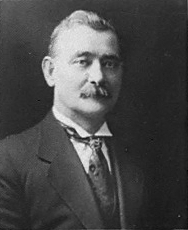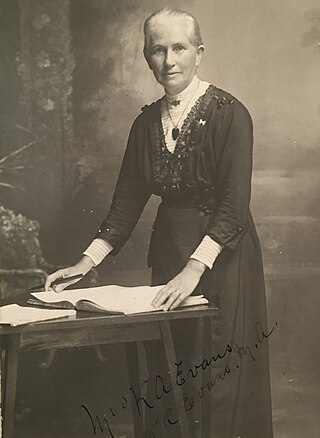Related Research Articles
The Social Democratic Party of New Zealand was an early centre-left to left-wing political party. It existed only a short time before being amalgamated into the new Labour Party. During its period of existence, the party held two seats in Parliament.

William Pember Reeves was a New Zealand politician, cricketer, historian and poet who promoted social reform.
The following lists events that happened during 1891 in Australia.

Ted Howard, born as Edwin John Harney, was a New Zealand politician of the Labour Party, and the father of cabinet minister Mabel Howard. He had been a prominent member of the New Zealand Socialist Party, a precursor to the Labour Party.
Professor Susan Margaret Magarey, is an Australian historian and author, most notable for her historic works and biographies of Australian women.

Kate Milligan Evans was the first woman in New Zealand to gain a university degree, and possibly the second in the British Empire to do so.
Isabella May was a New Zealand temperance worker, suffragist and dress reformer.
Patricia Ann Grimshaw, is a retired Australian academic who specialised in women's and Indigenous peoples' history. One of her most influential works is Women's Suffrage in New Zealand, first published in 1972, which is considered the definitive work on the story of how New Zealand became the first country in the world to give women the vote.
Kerrie Mengersen is an Australian statistician. Since 2016, she has been Distinguished Professor of Statistics at Queensland University of Technology in the Science and Engineering Faculty.
Melanie Nivison Oppenheimer, is an Australian historian, who specialises in the history of volunteering, and a former actress.
Jillian Isobel Roe, was an Australian historian and academic, who wrote a definitive biography of the Australian writer Miles Franklin.
Cora Vellekoop Baldock is an Australian-Dutch Sociologist. She was president of the Australian Sociological Association 1979-1980 and served as a member of the Australian Federal Government's Multicultural Advisory Committee. She was the first female professor at Murdoch University, Perth, and its first professor of sociology.
Nancy Jobson was an Australian teacher and headmistress.
Jean Isobel Martin FASSA was an Australian sociologist who was a pioneer of the discipline in Australia. Many of her works examined the role of immigrants in Australian society. Her academic career "spanned teaching and research appointments in seven Australian universities".
Raelene Frances, is an Australian historian and academic at the Australian National University.
Philippa Marian Sawer is an Australian political scientist. She is a professor emeritus at the Australian National University (ANU).
Wilfred David "Mick" Borrie was a New Zealand-born Australian demographer and academic.
Ngaire May Naffine is an Australian feminist legal academic and Professor Emerita at the University of Adelaide.
The 1908 Blackball miners' strike was industrial action that happened when seven miners in the small town of Blackball, on New Zealand's West Coast, were dismissed for taking longer than their allocated fifteen minutes, for lunch. This was one of many issues that were causing discontent within the coal-mining industry that was set up as a series of capitalist enterprises to meet the shipping needs of Britain as an imperial power. When Blackball township was established, the mining company provided low-quality living and working conditions for the miners and after the town became populated by immigrants with union experience overseas, some of the grievances that eventually resulted in the strike emerged. The strike has been seen as a formative event in New Zealand history because of the successful outcome for the miners from the eleven-week strike by the use of direct action and organised unionism. This was the first real challenge to the Arbitration Court, set up under legislation by the Liberal Government in 1894 to support mediation in industrial disputes, and highlighted the difficulties of getting a resolution because of the wide range of political, social and cultural factors that resulted in a degree of intransigence by both the miners and the mine company. A number of the leading strikers subsequently became leaders in the political labour movement.
Beverley Raphael was an Australian psychiatrist and academic. She was the first woman to be appointed professor of psychiatry in Australia.
References
- 1 2 3 "Professor Melanie Nolan" . Retrieved 16 April 2018.
- 1 2 3 4 Melbourne, The University of. "Nolan, Melanie – Woman – The Encyclopedia of Women and Leadership in Twentieth-Century Australia". www.womenaustralia.info. Retrieved 16 April 2018.
- 1 2 3 "Melanie Nolan". The Conversation. 24 March 2011. Retrieved 16 April 2018.
- ↑ Nolan, Melanie (1985). Jack McCullough : workers' representative on the Arbitration Court (Masters thesis). UC Research Repository, University of Canterbury. doi:10.26021/4982. hdl:10092/12857.
- ↑ "Missing in action | Inside Story". Inside Story. 14 March 2017. Retrieved 16 April 2018.
- 1 2 "Books | University of Canterbury". The University of Canterbury. Retrieved 16 April 2018.
- ↑ "Contacts – Canterbury University Press – University of Canterbury – New Zealand". www.cup.canterbury.ac.nz. Retrieved 16 April 2018.
- ↑ "Academy Fellow: Professor Melanie Nolan FASSA". Academy of the Social Sciences in Australia. Retrieved 12 October 2020.